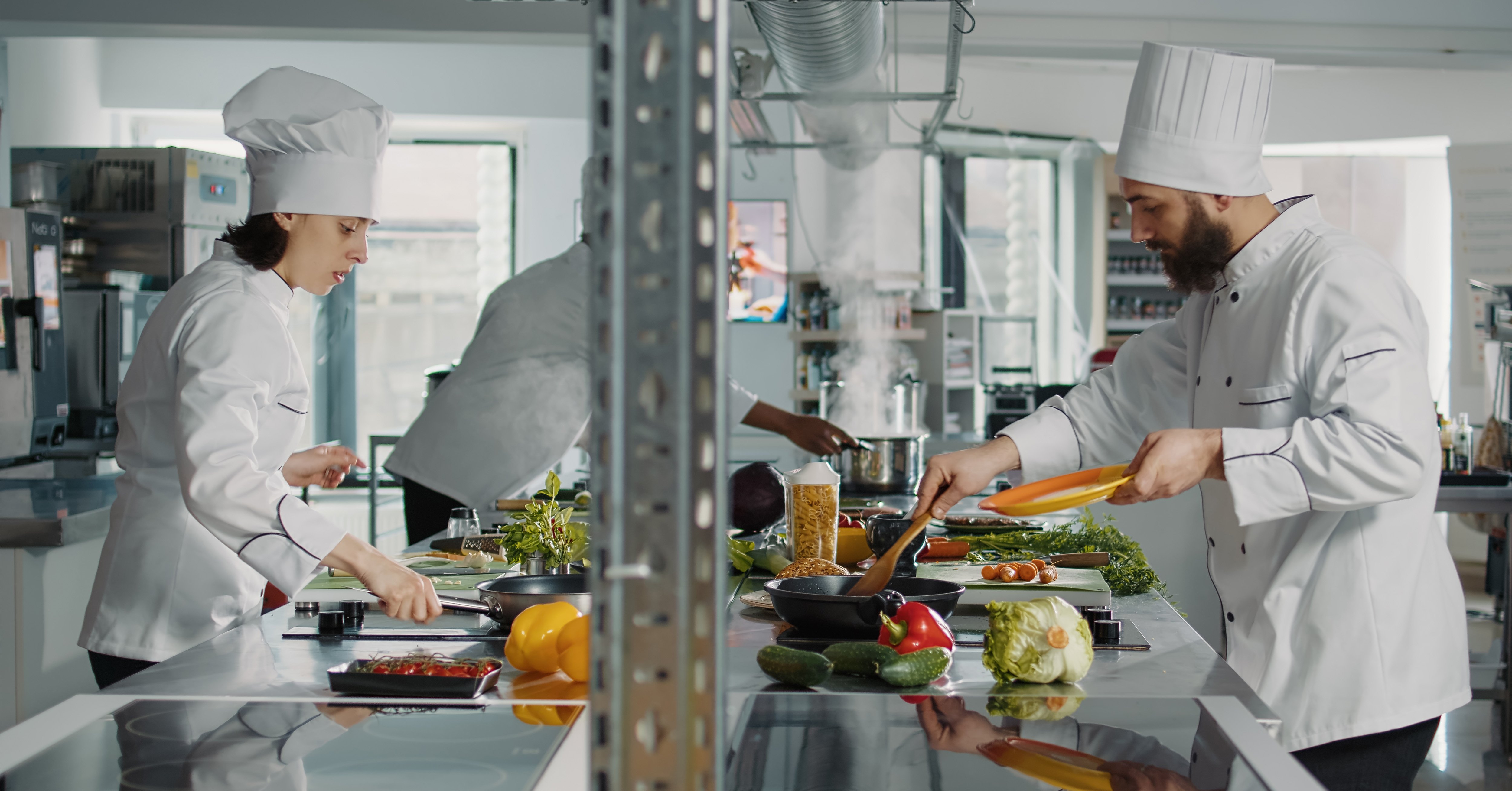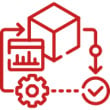
The emergence of cloud kitchens has significantly transformed the food industry landscape in recent years. These delivery-only eateries are alternatively termed ghost kitchens or virtual restaurants. They have revolutionised food preparation, distribution and consumption methods.

Given that analysts project the UK online food delivery market to touch USD 17.2 billion (GBP 12.8 billion) by 2025.
Cloud kitchen opens up a new potential in the hospitality sector with the pace it is growing. This comprehensive guide plunges into the intricacies of launching a cloud kitchen in the UK. We aim to offer aspiring restaurateurs an instructive, step-by-step blueprint for success.
Table of Contents:
- Definition and Concept of Cloud Kitchen
- Growing Trend of Virtual Restaurants
- Understanding Cloud Kitchens
- Market Analysis and Opportunities
- Legal and Regulatory Considerations
- Step-by-Step Guide for Starting a Cloud Kitchen in the UK
Definition and Concept of Cloud Kitchen
A cloud kitchen, at its core, exclusively operates for online food orders and deliveries. But it lacks a dine-in facility which has its pros and cons. This innovation enables food entrepreneurs to streamline their operations by reducing overhead costs while catering. It also helps meet the escalating demand for convenient food delivery options. Cloud kitchens provide an alternative that is both scalable and cost-effective compared with traditional brick-and-mortar restaurants.
Growing Trend of Virtual Restaurants
Online food delivery platforms' ascent and consumer preferences' shift have propelled the UK's virtual restaurants to rapid growth. Consumers, drawn by the convenience of ordering food with a simple touch, increasingly rely on online delivery services for their dining requirements. Consequently, this burgeoning demand has surged the need for cloud kitchens. Hundreds of virtual restaurants have mushroomed across the country in response to it already.
Understanding Cloud Kitchens
Understanding the inner workings of cloud kitchens is essential for grasping their potential. Unlike traditional restaurants, these establishments operate solely in a delivery format. This specialised operation allows them to concentrate exclusively on fulfilling online orders. It is this streamlined approach that enables them to maximise efficiency and reduce overhead costs. The lack of dining helps them easily deliver high-quality food punctually and directly to customers' doorsteps.
Market Analysis and Opportunities
Dive into the realm of cloud kitchens only after conducting a meticulous market analysis. Lack of sufficient knowledge can lead to a major downfall even when comes to cloud kitchens. Identify opportunities and assess the competitive landscape through careful examination; by analysing market trends, consumer preferences, and competitor strategies.

Aspiring restaurateurs can glean valuable insights into potential demand for their cloud kitchen concept with thorough study. Furthermore, the exploration of niche markets and untapped customer segments may unveil unique growth prospects. If you come up with a unique USP you might get an opportunity to succeed despite the competition.
Legal and Regulatory Considerations
To set up a cloud kitchen in the UK, one must navigate the essential steps of its legal and regulatory landscape. This process involves obtaining necessary licenses and permits which cannot be ignored.
Under the 2013 Food Hygiene (England) Regulations, you must register your food business with the local authority at least four weeks before commencing operations. Additionally, if your operations do not involve direct consumer sales, you will need approval for food premises establishment.
Ensuring compliance with food safety regulations presents several legal considerations that require addressing before launching your venture. Operating your cloud kitchen fully within the confines of the law becomes achievable through a close alliance with both legal professionals and regulatory authorities.
Step-by-Step Guide for Starting a Cloud Kitchen in the UK
 Decide the Business Model:
Decide the Business Model:
- You can select from a diverse range of cloud kitchen models: standalone; multi-brand; virtual restaurants. These restaurants operate exclusively online and typically deliver food directly to customers without physical dining options. If you do not want to splurge. shared kitchen spaces managed by either operators or aggregators can be a good option.
- Assess the advantages and disadvantages inherent in each business model; subsequently, align your goals, resources, and target market with the most suitable one.

Select Location and Property:
- Prime locations with high foot traffic are not a requirement for cloud kitchens, unlike traditional restaurants.
- Seek affordable properties in remote or industrial areas which are still accessible. They should provide spaciousness for kitchen operations. The main factor is that there should be easy accessibility to delivery routes.

Obtain Licences and Approvals:
- Ensure you register your food business with the local authority and secure all indispensable licences and permits for operating a cloud kitchen.
- One must actively ensure compliance with food safety regulations, health codes and all other legal requirements to circumvent potential fines or penalties.

Buy Kitchen Tools and Packaging:
- Spend money on top-notch kitchen tools such as cookers, fridges, prep areas, and places to keep stuff.
- Pick packaging that stands up to delivery needs and think green. Quality and safety are king.
Hire Good People:
- Get a crew of pro chefs and kitchen workers who know their way around making and packing grub for delivery.
- Create solid training in food safety, keeping things clean, and how to treat customers right.
 Spread the Word:
Spread the Word:
- Build a strong plan for telling folks about your cloud kitchen to pull in foodies.
- Connect with potential diners and boost visiting your cloud kitchen through online ads, socials, and web marketing.
Use Tech:
- Use software for running your cloud kitchen, handling orders, and keeping an eye on what is in stock.
- It is smart to use web ordering systems and apps. Let customers see where their food is, it makes ordering a breeze.
Keep Tabs and Make Changes:
- Watch things like how many orders you are getting, how happy your customers are; and how fast you deliver. Find out what needs to get better.
- Respond to changing market conditions, customer preferences, and industry trends with agility and adaptability.
With the growing number of online food delivery services in the UK, cloud kitchens present ambitious restaurateurs with a unique opportunity. By implementing an appropriate strategy, providing ample capital and personnel resources, and unyielding determination, they will strive to establish a cloud kitchen that will prove rewarding and highly lucrative in an industry that is constantly evolving.
StockTake Online
StockTake Online presents an array of tools, meticulously crafted for the streamlined management of both cloud kitchens and conventional restaurants. Empowering businesses with intuitive features and user-friendly interfaces allows us to cultivate data-driven decisions. STO serves as your trusted partner in every stage. Whether you are commencing your expedition into cloud kitchens or aiming to expand current restaurant operations you will find help every step of the way. We are armed with extensive resources and a committed support team, which guarantees you the essential elements for excelling in food service's cutthroat realm.
Still got your doubts? Read what is a cloud kitchen to get more insights on the topic.
Keynotes
- Cloud kitchens, alternatively referred to as ghost kitchens or virtual restaurants, operate solely for delivery and lack a dine-in facility.
- By 2025, the projected value of the UK's online food delivery market is USD 17.2 billion (GBP 12.8 billion); this projection suggests an opportune time to look into cloud kitchen ventures.
- In addition to maximising efficiency and reducing costs, cloud kitchens offer a scalable, cost-effective alternative to traditional restaurants due to the integration of technology and streamlined operations.
- When initiating a cloud kitchen in the UK, one must prioritise legal considerations: obtaining licenses and permits and ensuring compliance with food safety regulations.


